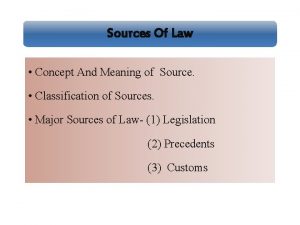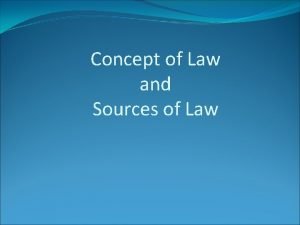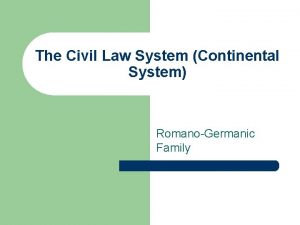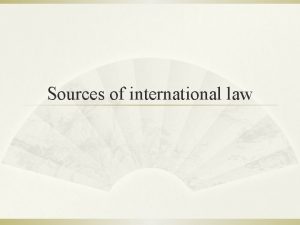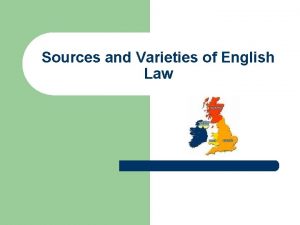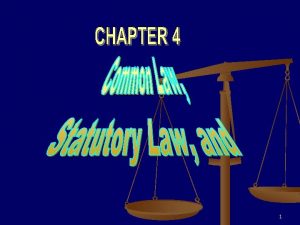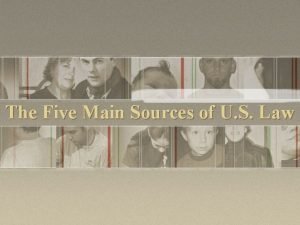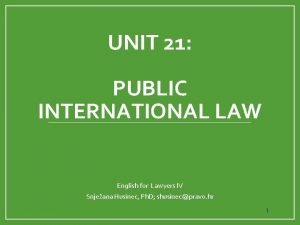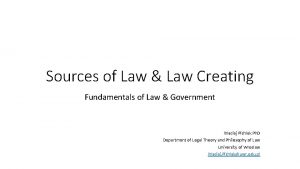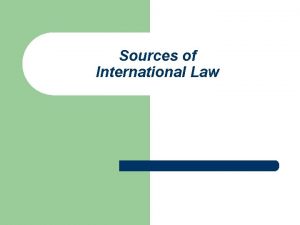Sources of Law Law Creating Fundamentals of Law
















- Slides: 16

Sources of Law & Law Creating Fundamentals of Law & Government Maciej Pichlak Department of Legal Theory and Philosophy of Law University of Wroclaw Room 302 A | maciej. pichlak@uwr. edu. pl https: //prawo. uni. wroc. pl/user/12147

The concept of the source of law SOURCES OF LAW Fontes iuris oriundi material formal Fontes iuris cognoscendi official unofficial

Formal sources of law – the (ideal? ) model…

Formal sources of law – the (ideal? ) model… Constitution Legislation Subordinate legislation Local laws etc.

… and the (harsh? ) reality constitution general principles legislation international treaties Subordinate legis. / regulation local laws and byelaws case law internal laws EU law standards of equity customary law

Constitution Determines basic legal, political, and economic order of the state. Typically, it regulates: • the government and relationships of its constituent parts, and • basic rights and freedoms of citizens. Possesses supremacy over legislation and other laws. More difficult to replace or amend.

UK: unwritten (uncodified) constitution There are three main sources of constitutional rules: (1) statutes: include those relating to the structure of the state such as the Act of Union 1705 and the European Communities Act 1972, those regulating the organs of state such as the Parliament Acts 1911 and 1949, and those relating to fundamental rights such as Magna Carta and the Human Rights Act 1998; (2) case law: created in the ordinary courts; (3) conventions: the rules of the constitution that cannot be enforced by a court. They are at least as important as statutes, but must not be inconsistent with statute law or case law. Youngs, p. 7

Legislation (statutory law) • Described also as primary legislation or parliamentary acts. • Enacted by the legislatory body (parliament). • Issued in the form of either code or statute (piecemeal legislation). • Sometimes (France) divided further into organic laws (lois organiques) and ordinary laws (lois ordinaries). • Published in official journal.

Subordinate legislation / regulation These forms of legislation that are inferior to and subordinated to the priamry legislation. Two models: as delegated legislation or as independent regulation. Delegated legislation: Poland Independent regulation: USA • As a prerogative power of the executive branch of government • The elelement of the system of check and balance Special case: independent regulatory agencies (IRA’s)

Delegated legislation: regulation in Polish law (rozporządzenie) Article 92 of the Polish Constitution: 1. Regulations shall be issued a) on the basis of specific authorization contained in statutes b) for the purpose of implementation of statutes c) by the organs specified in the Constitution. 2. The authorization shall specify a) the organ appropriate to issue a regulation b) the scope of matters to be regulated c) guidelines concerning the provisions of such act.

International treaties • Ratification: the act of formal signing and confirmation. • In some cases (and countries), ratification requires also a consent by legislation. • When this is the case, it usually takes priority over statutory law. • Incorporated into the legal system of the state.

The European Union law 1. Primary law Treaties: Treaty on the Functioning of the European Union (Lisbon Treaty, 2007) 2. Secondary law • • • Regulations Directives Decisions, opinions and recommendations 3. Supplementary law • • Case law of CJEU General principles An autonomous system, at the same time forming a part of the state law of the member states.

The European Union law Its position in the legal system of member states: Direct effect (van Gend en Loos 1963) Supremacy/ Priority (Costa v. ENEL 1964) Where in the hierarchy? • German Constitutional Court: Solange I (1974) and Solange II (1986).

Case law Precedent in the common law and the civil law systems: Precedent de iure (binding) or de facto (persuasive) Binding precedent: - binding for future cases (stare decisis principle); - independent and sufficient ground for decision. The doctrine of precedent and the possibility of overruling.

Customary law • • • Perpetuated and steady practice General conviction on a binding character (opinio iuris) Authentication by state authorities Where is it used? • Public international law; • laws of indigenous people (Africa, South and North America, Australia); • commercial law; • common law.

Internal laws: Poland (Resolutions and orders) Article 93 of the Polish constitution: • Shall bind only the units organizationally subordinate to the organ which issues such act; • shall not serve as the ground for decisions taken in respect of citizens, legal persons and other subjects; • shall be subject to scrutiny regarding their compliance with universally binding law.
 Print sources and web sources
Print sources and web sources Importance of water resources
Importance of water resources Material source of law
Material source of law Asylum case summary
Asylum case summary Object of law
Object of law Sources of civil law
Sources of civil law Sources of domestic law
Sources of domestic law The sources of english law
The sources of english law Continental law
Continental law Sources of common law
Sources of common law 5 main sources of us law
5 main sources of us law Sources of international law
Sources of international law Treaties in international law
Treaties in international law International laws
International laws Five main sources of law
Five main sources of law Newton's first law and second law and third law
Newton's first law and second law and third law Si unit of newton's first law
Si unit of newton's first law


